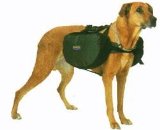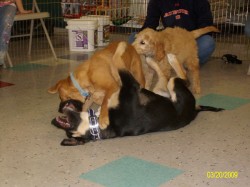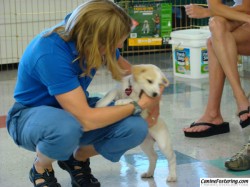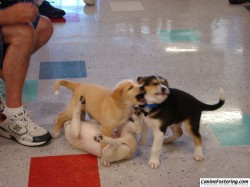Letter from a frustrated dog owner
Here’s an exchange with a person who I’ve been working with recently to get their dog ready to take the American Kennel Club‘s Canine Good Citizen (CGC) test.
The question:
Kristin,
I’m really frustrated with where we are right now with S’s walking. As long as there are no distractions, he does fairly well. It’s something we could continue to work with. But if there are distractions, it all goes out the window. Last night he saw a squirrel within the first 100 yards and from then on he was pulling at the leash the whole time looking for the next squirrel or rabbit. I had been hoping to have a pleasant walk so I didn’t have any treats with me. But it really wouldn’t have mattered. You can get his attention with a “watch”, depending on how far away the distraction is, but as soon as you reward him for it, he’s back to the distraction.I’m really torn. I’d like to not have to be in training mode every time we go for a walk. Plus, to really do it right, I would need a whole bag of treats and would have to eliminate a meal. But if I don’t work with him, then I feel I’m reinforcing negative actions on his part. And my arm gets tired.
Plus I have no idea how you trained your dogs not to pee or poop on walks. It takes him less than a stride to get all four feet planted and he’s almost immovable then. Any ideas?
T-
And my response:
Dear T-
Not being next to you on the walk makes it hard for me to really get what’s going on. Maybe one of these nice late summer days we could do just that…? But, what you have to do is to keep up with the walking. I agree, treats aren’t really the answer. It is sort of about respect in my opinion…he believes his “work” (hunting critters – his job that he’s assigned himself in lieu of anything else to do) is more important than anything you have to tell him. So, somehow, we’ve got to get across that we have a different job in mind for him, a better one. But until he gets this, really understands this on his doggy level, he just doesn’t see the point in not doing it.
 So, sometimes a harsher correction tool can help – a prong/pinch collar helps communicate in no uncertain terms that his behavior isn’t appreciated. The correction makes sense to him and is aversive enough (without being cruel) to get through to him that you want him to stop. Other options include giving him another job while on walks. That’s where a good back pack comes in handy. I recommend dog back packs from RuffWear. They make packs that I’ve seen and used and are acceptable. Fill the pack with up to 20% of S’s body weight and then go for the walk. It is amazing how this can change a dog. Plus, it’s hard to pee with a pack on.
So, sometimes a harsher correction tool can help – a prong/pinch collar helps communicate in no uncertain terms that his behavior isn’t appreciated. The correction makes sense to him and is aversive enough (without being cruel) to get through to him that you want him to stop. Other options include giving him another job while on walks. That’s where a good back pack comes in handy. I recommend dog back packs from RuffWear. They make packs that I’ve seen and used and are acceptable. Fill the pack with up to 20% of S’s body weight and then go for the walk. It is amazing how this can change a dog. Plus, it’s hard to pee with a pack on.
So, try those things. However, your comment about not wanting to be in training mode with each walk is also a clue that you are losing your patience. I hope you come to accept that you kind of do need to always be in training mode when out with your dog. The training gets easier with time, but you can never just check out. It’s sort of like parenting – you’re always on, no matter how old they get. The older they get, the easier and less intensive the work is, but you still are the dad, always. So, try to find a place of acceptance with that fact. So, try to find a place of acceptance with that fact. This doesn’t mean that you have to tolerate a sore arm and a disrespectful dog, but you do have to continue training him his whole life.
Let me know if this helps.
-Kristin
A puppy with a biting problem
I’ve been working with a very sad case of a puppy who bites when frustrated. Ordinarily, that isn’t that unusual as all puppies need to learn (and therefore be taught) to tolerate frustration. They need to learn patience and self control much like people need to learn those skills. They are the foundation of what we consider “manners.” When young puppies are very frustrated, it is normal for them to bite. However, all puppies who are healthy and have been raised with their mama and littermates have a natural respect for those in charge. And they all learn something called “bite inhibition.” They learn to hold back from biting full strength, and to use a bite only as a last resort. Their mama teaches them by her reactions when they do bite too hard or too quickly – she swiftly puts them in their place, usually by a nip of her own and a hard growl. And as puppies play together they learn that a hard bite stops play and that a soft bite lets it continue. Through these daily interactions all puppies raised well learn this important social skill.
Not this little puppy. At 2 months of age this puppy would bite hard enough to draw blood, whenever it was even a bit frustrated. By the time I saw him at 4 months of age, he was confident in his ability to boss people around and bit frequently and with very little provocation. He bit me three times before I even knew what had happened, and that isn’t a common occurrence for me! What is so sad is that this sort of behavior in a puppy so young is highly unusual – to the point of being considered abnormal. It suggests that something has gone very wrong in this puppy’s neurological development or upbringing. I suspect that a large piece of the puzzle is that this particular puppy, even though he is registered with the American Kennel Club, was purchased at a pet store. It is likely that he wasn’t a product of one of the notorious puppy mills, but he could have been. It is more likely that he was taken from his mama and littermates far too young – I’d guess at about 3 or 4 weeks. And his mama is likely mentally unstable herself. It is such a sad story. The family who owns him loves him dearly but the pup has bitten everyone, and there are young children who live in the home. It is my strong opinion that this dog should be rehomed, if there is a home who could work with him. But I strongly suspect that this pup will likely have to be euthanized.
 So, please, I cannot stress this enough, please do not purchase puppies from pet stores. Adopt a homeless puppy from a shelter or a foster home (H.E.L.P. is a great resource!). If you must, use a reputable breeder. Make sure they insist on keeping their puppies until they are at least 8 weeks of age. Make sure they keep them in such a way so that they have frequent contact with their mama. And make sure that they are willing to (and interested in) making any problems like this one, right.
So, please, I cannot stress this enough, please do not purchase puppies from pet stores. Adopt a homeless puppy from a shelter or a foster home (H.E.L.P. is a great resource!). If you must, use a reputable breeder. Make sure they insist on keeping their puppies until they are at least 8 weeks of age. Make sure they keep them in such a way so that they have frequent contact with their mama. And make sure that they are willing to (and interested in) making any problems like this one, right.






